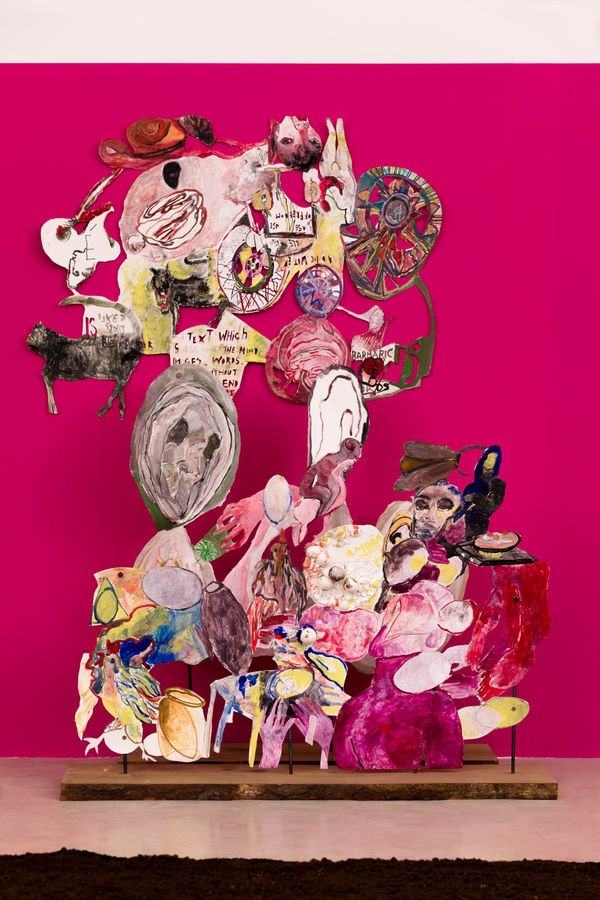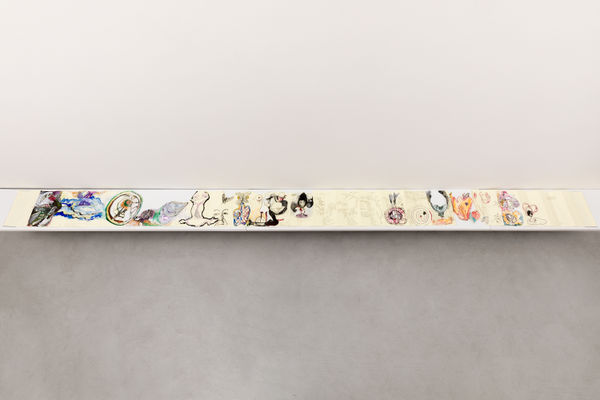Conversations on limits and unlimits Anna Boghiguian
Past exhibition
Overview
Women can’t write, women can’t paint
but what have I done with my life?
The truth should be spoken courageously
I want to put into words but without description the existence of
the cave that some time ago I painted-and I don't know how.
To remake myself and remake you I return to my state of garden and shadow,
I barely exist and if I exist it's with delicate caution.
These extreme cases of death are not provoked by cruelty,
the least dangerous is, in meditation, see, which dispends words of
though It’s almost too dark to see
To be silent; to be alone.
All the being and the doing, expansive, glittering, vocal, evaporated; and one shrunk,
with a sense of solemnity, to being oneself, a wedge-shaped core of darkness, something
invisible to others.
Iam the cockroach, I am my leg, I am my hair, I am the section of brightest light on
the wall plaster
Just put out the light in the hall
It was done; it was finished.
Yes, she thought, laying down her brush in extreme fatigue,
I have had my vision
– Excerpts from Acqua Viva, The Egg and The Chicken, The Passion According to G.H. by Clarice Lispector and To The Lighthouse by Virginia Woolf
Mendes Wood DM São Paulo is pleased to present Anna Boghiguian's first solo exhibition at Mendes Wood DM. Boghiguian lives a nomadic life, from Egypt to Canada and from India to France, collecting the history of violence through her personal experience of movement, borders, and belonging. The exhibition is a conversation between books by Clarice Liscepctor and Virginia Woolf, two women who explored pictorial art in the semantic limits of literature, unimagined images.
The artist's recent work unites all the discrepant potentialities in Clarice's writing, so as cockroaches coming out of the closet in The Passion According to G.H., that rejected by humans, has more to teach us about the limitations of our gaze than any other living being in the world. The transgressions contained in the author and indirect character's eyes question arrangements far beyond the social field; they are analytical exercises of existence.
Anna Boghiguian paints and cuts images from the Lispector universe and dates them back in a sort of temporal displacement of the human gaze, as does the writer. The work prompts who see, not for lax, but in an exercise of self-writing in this place of silence. Leaving several empty fields in the pictorial narrative, the cut-outs on paper covered by pigment and beeswax comprise the dirt of her drawings with the noble matter.
This nobility arises in the metal sheets works about Virginia Woolf's renowned novel To the Lighthouse. The insecurities of the fictional character Lily Briscoe, who is a painter working on a book illustration, create the stamina and mystery of the light of a lighthouse but leaves several punctuations deliberately unsaid in writing.
Boghiguian is nonlinear and presents a work that is as sensitive, aggressive furthermore metaphysical as the writers inflicted in these images, and the exhibition is precisely these non-border interchanges between art and literature.
but what have I done with my life?
The truth should be spoken courageously
I want to put into words but without description the existence of
the cave that some time ago I painted-and I don't know how.
To remake myself and remake you I return to my state of garden and shadow,
I barely exist and if I exist it's with delicate caution.
These extreme cases of death are not provoked by cruelty,
the least dangerous is, in meditation, see, which dispends words of
though It’s almost too dark to see
To be silent; to be alone.
All the being and the doing, expansive, glittering, vocal, evaporated; and one shrunk,
with a sense of solemnity, to being oneself, a wedge-shaped core of darkness, something
invisible to others.
Iam the cockroach, I am my leg, I am my hair, I am the section of brightest light on
the wall plaster
Just put out the light in the hall
It was done; it was finished.
Yes, she thought, laying down her brush in extreme fatigue,
I have had my vision
– Excerpts from Acqua Viva, The Egg and The Chicken, The Passion According to G.H. by Clarice Lispector and To The Lighthouse by Virginia Woolf
Mendes Wood DM São Paulo is pleased to present Anna Boghiguian's first solo exhibition at Mendes Wood DM. Boghiguian lives a nomadic life, from Egypt to Canada and from India to France, collecting the history of violence through her personal experience of movement, borders, and belonging. The exhibition is a conversation between books by Clarice Liscepctor and Virginia Woolf, two women who explored pictorial art in the semantic limits of literature, unimagined images.
The artist's recent work unites all the discrepant potentialities in Clarice's writing, so as cockroaches coming out of the closet in The Passion According to G.H., that rejected by humans, has more to teach us about the limitations of our gaze than any other living being in the world. The transgressions contained in the author and indirect character's eyes question arrangements far beyond the social field; they are analytical exercises of existence.
Anna Boghiguian paints and cuts images from the Lispector universe and dates them back in a sort of temporal displacement of the human gaze, as does the writer. The work prompts who see, not for lax, but in an exercise of self-writing in this place of silence. Leaving several empty fields in the pictorial narrative, the cut-outs on paper covered by pigment and beeswax comprise the dirt of her drawings with the noble matter.
This nobility arises in the metal sheets works about Virginia Woolf's renowned novel To the Lighthouse. The insecurities of the fictional character Lily Briscoe, who is a painter working on a book illustration, create the stamina and mystery of the light of a lighthouse but leaves several punctuations deliberately unsaid in writing.
Boghiguian is nonlinear and presents a work that is as sensitive, aggressive furthermore metaphysical as the writers inflicted in these images, and the exhibition is precisely these non-border interchanges between art and literature.
Works
-
 Anna Boghiguian, Untitled 1, 2019
Anna Boghiguian, Untitled 1, 2019 -
 Anna Boghiguian, Untiled 4, 2019
Anna Boghiguian, Untiled 4, 2019 -
 Anna Boghiguian, Untiled 2, 2019
Anna Boghiguian, Untiled 2, 2019 -
 Anna Boghiguian, Untitled 3, 2019
Anna Boghiguian, Untitled 3, 2019 -
 Anna Boghiguian, Conversation with Clarice 2, 2019
Anna Boghiguian, Conversation with Clarice 2, 2019 -
 Anna Boghiguian, Conversations with Clarice, 2019
Anna Boghiguian, Conversations with Clarice, 2019 -
 Anna Boghiguian, Blue book, 2019
Anna Boghiguian, Blue book, 2019 -
 Anna Boghiguian, To the lighthouse, 2019
Anna Boghiguian, To the lighthouse, 2019
Installation Views









